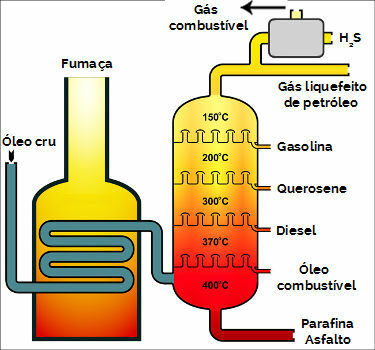Diesel oil is an oily looking fuel (as the name suggests) obtained from fractional distillation (refining) of Petroleum. Its composition is considered complex because it has substances such as Hydrocarbons (in greater quantity) and organic compounds with nitrogen, oxygen and sulfur.
Of all petroleum products (such as Gasoline, lubricating oil and kerosene), O diesel oil it is more abundant, that is, it is the fraction with the greatest amount in oil.
1. Diesel oil characteristics
- Clear appearance;
- Toxicity considered medium;
- No suspended material (solid waste);
- It has a strong and characteristic smell;
- It is a little volatile liquid;
- It's flammable.

2. Diesel oil uses
O diesel oil, in general, has great applications in the road sectors (when used in cars, buses, vans and trucks) and industrial (when used in electrical generators or to keep heating in boilers). It is noteworthy that small vessels also use this fuel.
In Brazil, the use of diesel oil is very much directed towards the transport of cargo, mainly in truck engines, as a large part of the distribution of products throughout the country is made by highways.

3. Way of obtaining diesel oil
As it is a direct petroleum derivative, diesel oil is obtained using the mixture separation method called fractional distillation (used when the mixture has more than one liquid, as in the case of Petroleum).
Fractional distillation, or petroleum refining, is based on the difference in boiling point between the components of the mixture. In the case of diesel oil, its separation occurs when the temperature reaches values between 220ºC and 380ºC. The other components of oil are separated into other boiling ranges.

4. Types of diesel oil
In Brazil, the National Petroleum Agency (ANP), from resolution 65 of 2011, determined that two types of diesel oil may be marketed for use in vehicles. Are they:
Do not stop now... There's more after the advertising ;)
Diesel type A: from petroleum refining processes without the addition of biodiesel;
Type B diesel: it is the diesel type A that receives the addition of biodiesel;
The same ANP resolution from 2011 still classifies these fuels, according to the sulfur levels they present, in:
- S10: diesel with 10 mg of sulfur per kg of oil;
- S50: diesel with 50 mg of sulfur per kg of oil;
- S500: diesel with 500 mg of sulfur per kg of oil;
- S1800: diesel that has 1800 mg of sulfur per kg of oil.
As of 2014, only the S10 and S50 are being marketed, as it is necessary to promote the reduction of levels of sulfur gases in the air.
5. Harms of using diesel oil
a) Presence of sulfur
At the diesel oil, there is the presence of sulfur, which, during combustion, forms the toxic gases sulfur dioxide and sulfur trioxide. These gases are eliminated in the atmosphere and contribute to increased air pollution and the formation of acid rain.
If the sulfur trioxide gas formed reacts with water in the vehicle, sulfuric acid will form, which will cause corrosion of metal parts, especially in the engine.
b) Not renewable
as the diesel oil it is a direct petroleum derivative, its source is finite, as oil reserves are decreasing more and more.
6. Alternatives for not using diesel oil
a) Biodiesel production
Biodiesel is similar to diesel oil, but of animal or vegetable origin, through the esterification reaction of oils or fats with some catalysts.
In addition to being biodegradable, biodiesel does not have any sulfur content, having free burning from the production of sulfur dioxide and trioxide.
b) solar energy
Brazil has a high incidence of solar radiation. Therefore, it has a great potential for generating this type of energy.
Furthermore, if the vehicles themselves produced their solar energy, there would be a decrease in demand for fossil fuels such as diesel oil.
Would you like to reference this text in a school or academic work? Look:
DAYS, Diogo Lopes. "Diesel oil"; Brazil School. Available in: https://brasilescola.uol.com.br/quimica/oleo-diesel.htm. Accessed on June 27, 2021.
Chemistry

Emission of polluting gases, alcohol, diesel, gasoline, biodiesel, sugarcane fermentation, carbon monoxide, effect greenhouse, global warming, catalysts, dioxins in diesel, hormonal disturbances, device cancer respiratory.



